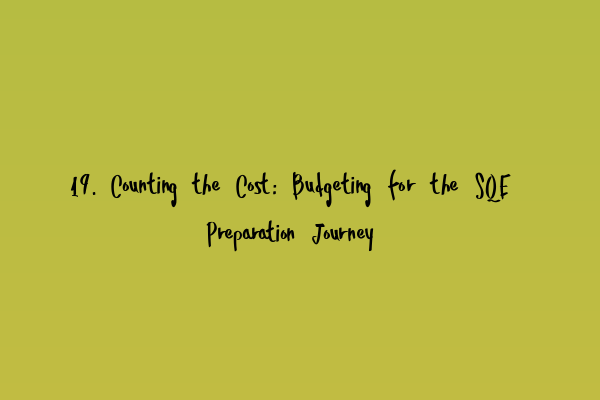Counting the Cost: Budgeting for the SQE Preparation Journey
Preparing for the Solicitors Qualifying Examination (SQE) is a significant undertaking that requires careful planning, dedication, and of course, financial investment. As you embark on this journey to become a qualified solicitor, it is important to consider the costs associated with SQE exam preparation. In this article, we will explore the various expenses involved and provide you with some tips on how to budget effectively.
1. Course Fees
One of the most significant costs you will incur during your SQE preparation is the course fees. Whether you choose to enroll in an online course or attend a physical classroom, these fees can vary depending on the provider and the level of support you require. It is crucial to research different course providers and compare their offerings to find a program that aligns with your learning style and budget. You can also look for discounts or scholarships that may be available to reduce the financial burden.
Related Article: SQE 1 Preparation Courses
2. Study Materials
To succeed in the SQE exams, you will need comprehensive study materials that cover the syllabus and provide practice questions and mock exams. Investing in high-quality textbooks, revision guides, and online resources can be crucial to your success. However, these materials can be quite expensive, so it is essential to set aside a budget for them. Consider whether you prefer physical books or digital resources and explore different options to find the best value for your money.
Related Articles:
SQE 1 Practice Exam Questions,
SQE 1 Practice Mocks FLK1 FLK2
3. Exam Registration Fees
In addition to the costs associated with preparation, you must also budget for the SQE exam registration fees. The Solicitors Regulation Authority (SRA) sets the examination fees, and they can vary depending on the number of exams you are required to take. It is essential to check the SRA website for the latest fee schedule and allocate an appropriate amount in your budget towards these fees.
Related Article: SRA SQE Exam Dates
4. Additional Support
Some students may choose to seek additional support during their SQE preparation journey. This could involve hiring a private tutor or attending supplemental revision classes. While these options can be beneficial, they often come at an extra cost. If you feel that you would benefit from personalized guidance or extra practice, it is important to factor these expenses into your budget.
5. Travel and Accommodation
If you are attending in-person courses or exams at a physical location, you should also consider travel and accommodation expenses. This includes transportation costs, such as flights or train tickets, as well as accommodation fees if you need to stay in a different city for an extended period. Planning ahead and booking in advance can help you secure better rates and minimize these costs.
6. Time Allocation
While not directly related to financial costs, it is essential to consider the time allocation required for your SQE preparation. Balancing your studies with work, family, and other personal commitments may necessitate adjustments to your daily routine and potentially reduce your income. It is important to factor in any potential loss of earnings and plan accordingly to ensure you have enough time to dedicate to your studies.
7. Budgeting Tips
Now that you are aware of the various expenses involved in preparing for the SQE, here are some tips to help you budget effectively:
- Research and compare different course providers to find the best value for your money.
- Consider purchasing second-hand or digital study materials to save money.
- Look for discounts, scholarships, or payment plans offered by course providers.
- Set realistic financial goals and create a budget that allocates funds specifically for your SQE preparation.
- Avoid unnecessary expenses during your preparation period to free up extra funds.
- Explore free or low-cost resources, such as online forums and study groups, for additional support.
Remember, investing in your SQE preparation is an investment in your future career as a solicitor. By budgeting effectively and making informed choices, you can navigate the financial aspect of the journey and set yourself up for success.
Related Articles:
SQE 2 Preparation Courses,
SQE 1 Preparation Courses
